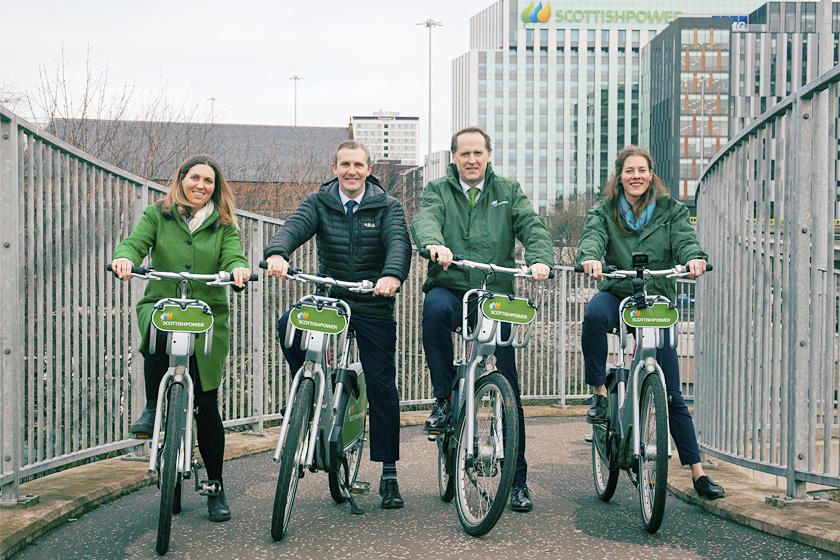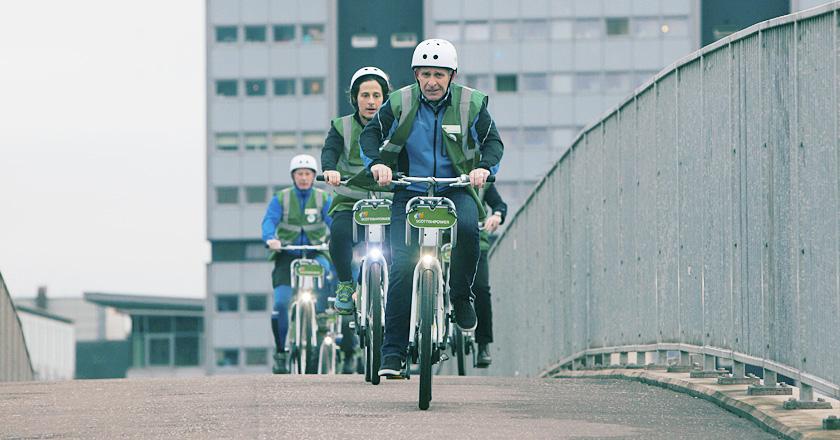- ScottishPower's Zero Carbon Communities offers detailed roadmap to help Glasgow become UK's first Net Zero city
- Capital Economics forecasts suggest more than 175,000 electric vehicle charging points and 244,000 heat pumps needed to reach ambitious 2030 net zero target
- ScottishPower announces sponsorship of Glasgow’s first fleet of e-bikes with nextbike as part of drive for low carbon transport
Glasgow, 6 February – ScottishPower has launched Zero Carbon Communities (ZCC) in Glasgow – the first detailed roadmap setting out the scale of the challenge for local communities in reaching the city’s Net Zero targets.

Based on forecasts commissioned by ScottishPower from Capital Economics, the independent research consultancy, today’s figures reveal for the first time Glasgow’s transport and home heating requirements to meet its 2030 Net Zero target. The roadmap launches nine months before the city hosts the UN Climate Change Conference, COP26.
ScottishPower has launched the Zero Carbon Communities campaign to help support communities to deliver on climate change. Each community across the UK is unique, requiring local solutions to meet local needs, and aligned investment plans so that we can support these communities right where they need it. Glasgow has set its own ambitious target to become the UK’s first Net Zero city, but how it gets there will be significantly different from other big cities across the country.
The scale of the challenge in Glasgow is clear. Capital Economics forecasts suggest that the city will need to install more than 175,000 charging points between now and 2030 to reach Net Zero, including nearly 17,000 chargers in non-residential areas. Capital Economics estimates the costs of installing these to be £298 million, and also estimates that converting Glasgow to electric heating will require c. £1.4 billion for the installation of electric heat pumps in over 244,000 homes.
Glasgow’s energy network will need considerable investment to support these changes, with Capital Economics estimating that £648 million will be required to achieve Net Zero. By investing in a planned and strategic way, SP Energy Networks believes there is potential to reduce significantly these network investment costs by 30%-40%.
As part of plans to modernise the city’s electrical network infrastructure, SP Energy Networks is investing £20m between now and 2022 to facilitate an increase in available network capacity and to support regeneration initiatives.
At the Glasgow Zero Carbon Communities launch, ScottishPower today announced a new partnership with nextbike to sponsor Glasgow’s first fleet of e-bikes, enhancing the city’s green transport offer. ScottishPower will sponsor 63 e-bikes and 21 charging points across the city. Given Glasgow’s hilly terrain, the city’s first e-bikes are ideal in helping to transition towards an electric future.
Keith Anderson, Chief Executive of ScottishPower, said: “With the UN Climate Change Conference, COP26, coming to Glasgow later this year, the city will be able to showcase its commitment to reaching Net Zero on a global stage.
“To reach Net Zero, we’ll all need to make changes as we move away from the fossil fuels that power our cars and heat our homes today. We’re committed to working with local communities to help them understand the best ways to decarbonise.
“We’re launching our Zero Carbon Communities campaign today to set out a road map for helping Glasgow in the drive to Net Zero. Upgrading heating systems and shifting to electric vehicles will require big changes, but they will have compelling social, economic and environmental benefits.
“Our sponsorship of Glasgow’s first fleet of e-bikes is a great example of how we can use electrical vehicles to reduce pollution.”

An increase in the use of electric vehicles will significantly help Glasgow reach its net zero goal by 2030. Switching from a daily car journey to an e-bike can save an average 249g of CO2 for every 1km travelled. More than 6,600 journeys have already been made on the city’s e-bikes since their initial launch in October 2019 and the new ScottishPower sponsorship will help to raise its profile and increase use.
Last year, Scotland’s first low-emission zone was introduced in Glasgow. This November, Glasgow will be the epicentre of international climate change dialogue when it hosts the globally renowned United Nations COP26 Climate Summit, which will bring together 200 world leaders and 30,000 influential delegates to debate climate change solutions.
Michael Matheson MSP, Cabinet Secretary for Transport, Infrastructure and Connectivity, said: “I welcome this latest report from Scottish Power, which is a milestone moment in their partnership with Glasgow City Council to make Glasgow the UK’s first ‘net-zero’ city. This work is crucial, because we know that Scotland’s world-leading and legally binding net-zero target cannot be met by Government alone. This continued partnership approach between businesses, local authorities and communities is exactly what is required to respond to the climate emergency and improve the air quality in our cities.
“The Scottish Government is doing its part. We’ve already invested over £30 million since 2011 to establish our comprehensive ChargePlace Scotland charging network. Our public network is largest in the UK, outside London, which we have developed in support of our commitment to phase out the need for new petrol and diesel cars and vans by 2032. We have also committed to investing over £500 million to support bus priority infrastructure measures and, in addition, we have maintained our record funding for walking and cycling which has helped support the public hire e-bike schemes here in Glasgow, in Edinburgh and across Forth Valley.
“It is encouraging that Scottish Power shares our view of the importance e-bikes can play in encouraging modal shift and reducing carbon emissions, and have committed to sponsoring the nextbike scheme, in order to promote its benefits to even more people across Glasgow.”
Councillor Anna Richardson, City Convener for Sustainability and Carbon Reduction, said: “The council cannot decarbonise Glasgow on its own and so it’s absolutely crucial that the private sector plays its part in achieving the city’s target of carbon neutrality by 2030.
“Scottish Power’s sponsorship of the Glasgow’s rental e-bikes is therefore a tangible example of the direction of travel we have to take as a city.
“The work they have undertaken through their Zero Carbon Communities project also provides much food for thought and the basis for further debate.
“A wide range of policies and programmes are currently being developed that will ensure Glasgow looks and operates very differently by 2030.
“For example, it is anticipated that garage forecourts will begin to replace petrol pumps with EV charging points, but also that a much greater reliance on active travel and other forms of sustainable transport will emerge.
“District heating systems will become far more common as well, all of which will greatly influence how we consume energy. It is essential Scottish Power and others are fully involved in the action on climate change in the years ahead.”
Talking about ScottishPower’s e-bikes sponsorship, Krysia Solheim, Managing Director at nextbike UK, said: “We’re thrilled to be welcoming ScottishPower as sponsors for our e-bike fleet in Glasgow. We know that bike share can play a vital part in reducing car dependency in our cities, and we’re excited to be playing a part ScottishPower’s plans to turn Glasgow into a Zero Carbon Community. It’s more important than ever that people start to think about how they can reduce their own carbon footprints – and thinking about the way we move around our cities is a great place to start.”
The Zero Carbon Communities initiative is also being rolled out across Liverpool, Edinburgh, Fife, Dumfries and Galloway, East Ayrshire, Cheshire and Warrington, and the Isle of Anglesey. For more information visit the ScottishPower website.
Media Enquiries: Simon McMillan on 07753 622257 or on email at Simon.McMillan@ScottishPower.com
Notes to Editors
- Net Zero is the point where the same volume of greenhouse gases is being emitted as is being absorbed through offsetting techniques like forestry.
- E-bikes are a combination of a conventional bike with a motor that take some of the effort out of pedalling for the rider. With top speeds of 25km per hour, the e-bikes can cover greater distances faster and with less effort.
- Electric bike rentals are not currently covered by current nextbike memberships. Customers can rent e-bikes using their existing nextbike accounts. Rides will be charged on a pay-as-you-ride basis at £2 per 20 minutes or £30 per day.
Key UK targets for the path to Net Zero by 2050
- Number of electric vehicle charging points needed by 2050: 25,299,147
- Number of these which will be installed in non-residential places: 2,627,280
- Estimated cost to install chargers across UK: £45.9 billion
- Number of homes that will install heat pumps by 2050: 22,808,780
- Estimated cost of installing these heat pumps: £192.2 billion
- Estimated network investment cost by 2050: £48.5 billion*
- Estimated jobs supported by decarbonisation investment: 115,780
Key Scotland targets on the path to Net Zero by 2045
- Number of electric vehicle charging points needed by 2045: 2,010,543
- Number of these which will be installed in non-residential places: 198,774
- Estimated cost to install chargers across Scotland: £3.6 billion
- Number of homes that will install heat pumps by 2045: 1,964,438
- Estimated cost of installing these heat pumps: £16.5 billion
- Estimated network investment cost by 2045: £5.2 billion*
- Estimated jobs supported by decarbonisation investment: 10,081
Key Glasgow targets for the path to Net Zero by 2030
- Number of electric vehicle charging points needed by 2030: 175,652
- Number of these which will be installed in non-residential places: 16,660
- Estimated cost to install chargers across Glasgow: £298 million
- Number of homes that will install heat pumps by 2030: 244,183
- Estimated cost of installing these heat pumps: £1.4 billion
- Estimated network investment cost by 2030: £648 million*
* Based on SP Energy Networks analysis, the co-ordinated and strategic use of SMART planning and advanced management techniques has the potential to reduce overall network reinforcement costs by 30%-40%.
ScottishPower
ScottishPower is the first integrated energy company in the UK to generate 100% green electricity. Our focus is on wind energy, smart grids and driving the change to a cleaner, electric future. We’re investing over £7m every working day to make this happen. We’re committed to speeding up the transition to cleaner electric transport, improving air quality and, over time, driving down bills – to deliver a better future, quicker for everyone.
ScottishPower is part of the Iberdrola Group, one of the world’s largest integrated utility companies and a world leader in renewables. More details about our work can be found on the ScottishPower website.
SP Energy Networks owns and manages overhead and underground power lines in Southern and Central Scotland as well as Merseyside, Cheshire, North Wales and North Shropshire. For more information about SP Energy Networks and its services visit: SP Energy Networks
Capital Economics
Capital Economics is a leading independent international macro-economic research consultancy, providing research on Europe, the Middle East, United States, Canada, Africa, Asia and Australasia, Latin America and the United Kingdom, as well as analysis of financial markets, commodities and the consumer and property sectors.
For further information about the methodology and research data included in this report, please contact Grant Colquhoun at Capital Economics.
Nextbike UK
Nextbike UK Ltd is a daughter company of nextbike GmbH, the world’s most extensive bike share provider. With over 200 schemes worldwide, including 10 in the United Kingdom, no other bike share provider offers as much coverage as nextbike.
Working with public and private organisations to bring high quality, European-made bike share schemes, nextbike has partnered with firms such as Santander Personal Banking and RBS. For more information please visit nextbike